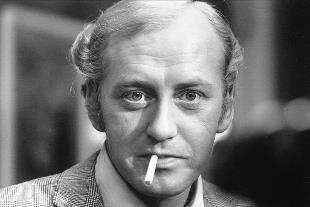
Nicol Williamson
Thomas Nicol Williamson[1] (14 September 1936 – 16 December 2011) was a British actor. He was once described by playwright John Osborne as "the greatest actor since Marlon Brando". He was also described by Samuel Beckett as "touched by genius" and viewed by many critics as "the Hamlet of his generation" during the late 1960s.
Nicol Williamson
Early life[edit]
Thomas Nicol Williamson was born on 14 September 1936[1][2][3][4] (he would later claim 1938 in Who's Who)[1] in Hamilton, Lanarkshire,[1] the son of Hugh Williamson, operator of an aluminium manufacturing plant[5][6] and former hairdresser's assistant, and Mary Brown Hill, née Storrie.[1] When he was 18 months old, his family moved to Birmingham, England. Williamson was sent back to Hamilton to live with his grandparents during World War II due to Birmingham's susceptibility to bombing, but returned when the war ended, and was educated at the Central Grammar School for Boys, Birmingham.[7] He left school at 16 to begin work in his father's factory and later attended the Birmingham School of Speech & Drama. He recalled his time there as "a disaster" and claimed "it was nothing more than a finishing school for the daughters of local businessmen".[2]
Career[edit]
Stage and screen[edit]
After his national service as a gunner in the Airborne Division, Williamson made his professional debut with the Dundee Repertory Theatre in 1960 and the following year appeared with the Arts Theatre in Cambridge. In 1962 he made his London debut as Flute in Tony Richardson's production of A Midsummer Night's Dream at the Royal Court Theatre. His first major success came in 1964 with John Osborne's Inadmissible Evidence, for which he was nominated for a Tony Award when it transferred to Broadway the following year. In spring 1981, he and original director Anthony Page revived the play for a six-week engagement at the Roundabout Theatre (23rd Street) in New York, fifteen years after the original Broadway run.[8]
Personal life[edit]
In 1971, Williamson married actress Jill Townsend, who had played his daughter in the Broadway production of Inadmissible Evidence. They had a son, Luke (born 1973), but divorced in 1977.[4][19]
Despite concerns over his health in the 1970s, Williamson admitted drinking heavily and claimed to smoke 80 cigarettes a day.[2] In an episode of The David Frost Show in the 1960s, during a discussion about death, which also involved poet John Betjeman, Williamson revealed that he was very much afraid of dying, saying that "I think of death constantly, throughout the day" and that "I don't think there is anything after this, except complete oblivion."
Death[edit]
Williamson died on 16 December 2011, aged 75, two years after being diagnosed with esophageal cancer.[4] In accord with Williamson's wishes, the news of his death was released a month later, as he did not want a fuss made over his death.[19]